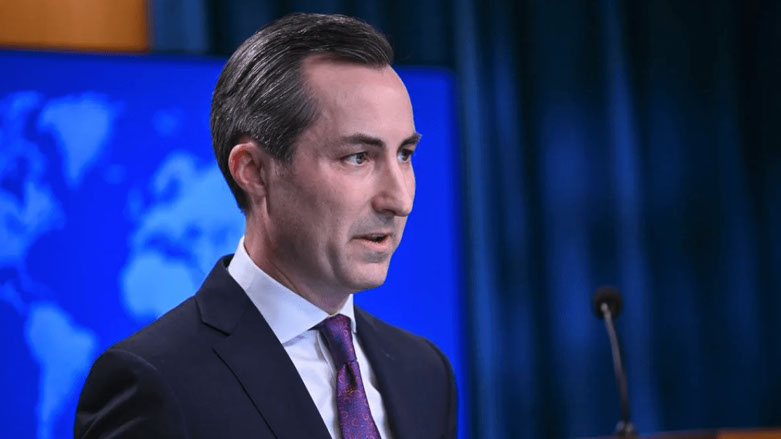U.S. Marks 9th Anniversary of Yezidi Genocide

WASHINGTON DC, United States (Kurdistan 24) – “Today we remember the victims and stand in solidarity with survivors of the Yezidi genocide perpetrated by ISIS terrorists,” State Department Spokesperson Matthew Miller said in a written statement issued on Thursday.
“ISIS abducted and killed thousands of Yezidis, forcing boys to become child soldiers and selling women and girls into sexual slavery,” he continued. “The number of people killed remains unknown, and discoveries of mass graves continue.”
In issuing Thursday’s statement, Miller joined senior Kurdish officials in denouncing the terrorist group’s atrocities.
In 2015, the long-time Kurdish leader, Masoud Barzani, then President of the Kurdistan Region, led the Peshmerga in the liberation of Sinjar, the major city of the Yezidis in northern Iraq. On Thursday, Barzani called on more countries to recognize the Yezidi genocide, as well as other atrocities that have been committed in northern Iraq.
Already in 2016, under President Barack Obama, the U.S. recognized ISIS’s assault on the Yezidis as a genocide, a position reiterated by the Trump administration.
This year, both Germany and Britain recognized ISIS’s assault on the Yezidis as a genocide, a point noted by Barzani.
“The Kurdish people expect the international community to recognize the Yezidi genocide as Germany and the U.K. have done,” he said, “along with other atrocities, including the chemical bombardment of Halabja and the Anfal campaign that was committed against the Kurdish people.”
Of course, it was the regime of Saddam Hussein which was responsible for the March 16, 1988, attack on Halabja, in which some 5,000 people died, as the Iraqi air force dropped a mixture of mustard gas and nerve agents on the city. That attack was, in turn, part of the regime’s Anfal campaign, which depopulated the Kurdish countryside and killed as many as 180,000 people.
But as the highly-regarded German news magazine, Der Spiegel, reported in an article based on captured ISIS documents and titled, “Secret Files Reveal the Structure of Islamic State,” the core of ISIS is the former Iraqi regime.
That would certainly help to explain the brutality of the terrorist organization.
ISIS, Der Spiegel stated, was established in Syria in 2013, in the midst of that country’s civil war. It was created by senior members of the military intelligence apparatus of Iraq’s ousted regime. They were individuals who had managed to avoid capture by the U.S.-led coalition which had brought down that regime.
The late Najmaldin Karim, the Kurdish governor of Kirkuk during the fight against ISIS, told Kurdistan 24 much the same.
Read More: Najmaldin Karim: Islamic State is resurgent, dominated by locals
Karim was careful to limit his remarks to Kirkuk province, which he knew well. He stressed that ISIS in Kirkuk were all local men. They grew beards; switched their pants for dishdashas and shouted, “Allahu Akhbar.”
But that, of course, did not make them different people. Their ideology was instrumental. Indeed, it was the supposedly “secular” Saddam Hussein, who put “Allahu Akhbar” on the Iraqi flag.
“They’re all local,” thus, Karim said in describing ISIS. “Peshmerga fought [them] bravely, and hundreds of them were killed.”
“We have their pictures, their DNA,” and “they’re all from the area,” he stressed.
Kurdish Leadership Calls for Implementing Sinjar Agreement
Masrour Barzani, Prime Minister of the Kurdistan Regional Government (KRG), marked the ninth anniversary of the Yezidi genocide with a call to implement the 2020 Sinjar Agreement that was concluded with Baghdad.
Read More: PM Barzani calls for implementing Sinjar Agreement on 9th Yezidi genocide anniversary
Barzani noted that the primary obstacle to the normalization of the situation in Sinjar was the continued presence of militias there, as he called for their ouster.
Last week, the U.S. issued a similar statement calling for the implementation of the Sinjar accord.
Read More: U.S. Calls for implementation of Sinjar Agreement
On Thursday, the European Union, the United Nations, and the United Kingdom all did the same, in addition to the calls coming from the Kurdistan Region, which included from Masoud Barzani.
Sinjar falls within the area that is under the control of Iraq’s federal government.
“Until when will the Iraqi government continue to allow the forces to hinder the implementation of the Sinjar Agreement?,” Barzani asked, as he called the agreement “the best solution” for normalizing the situation.
